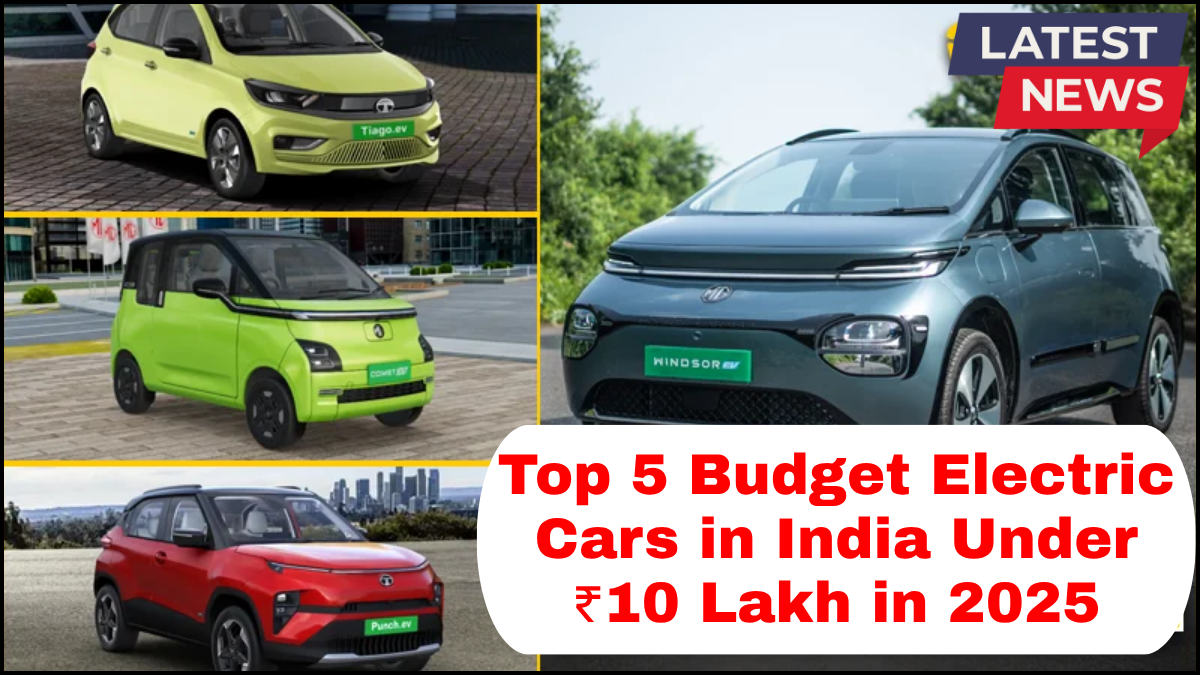With India rapidly transitioning towards electric mobility, automakers are stepping up to meet the rising demand for economical electric vehicles. If you’re looking to make the switch without burning a hole in your pocket, 2025 brings a solid lineup of top EV cars under ₹10 lakh. These cars combine affordability, practicality, and enough range for daily urban commuting, making them excellent choices for cost-conscious buyers. Here are the most affordable EVs in India that you should keep an eye on this year.

1. Tata Tiago EV
The Tata Tiago EV continues to dominate the budget EV segment in India, offering a solid package at an attractive price point.
- Price: Starting at around ₹8.5 lakh (ex-showroom)
- Range: Up to 315 km (MIDC)
- Battery: 24 kWh lithium-ion
- Charging Time: Approx. 3.5 hours (fast charger)
This hatchback delivers impressive value with robust build quality, peppy performance for city use, and a cabin that’s decently equipped. It’s ideal for first-time EV buyers looking for reliability and low running costs.
2. MG Comet EV
Compact, quirky, and ultra-efficient, the MG Comet EV is a great choice for urban driving and tight parking spots.
- Price: From ₹7.98 lakh (ex-showroom)
- Range: Up to 230 km
- Battery: 17.3 kWh lithium-ion
- Charging Time: 7 hours (standard AC charger)
While its small size may not suit everyone, the Comet EV is perfect for city dwellers who prioritize convenience and ease of maneuvering over long-range capability. Despite its size, it features a modern digital cockpit and smart connectivity features.
3. Citroen eC3
Citroen’s entry into the EV market, the eC3, offers a comfortable ride and funky French design with decent specs.
- Price: Starts around ₹9.99 lakh (ex-showroom)
- Range: Approximately 320 km
- Battery: 29.2 kWh lithium-ion
- Charging Time: 57 minutes (DC fast charging 10% to 80%)
The eC3 is one of the top EV cars under ₹10 lakh for those who need extra cabin space and highway capability. With its SUV-inspired styling, it appeals to younger buyers looking for a mix of practicality and flair.
4. Tata Punch EV (Expected)
Tata Motors is expected to expand its EV portfolio further with the electric version of its popular micro-SUV, the Punch.
- Expected Price: Under ₹10 lakh
- Estimated Range: 300-350 km
- Battery: Estimated 25-30 kWh
Though yet to be launched officially, the Punch EV is anticipated to deliver a strong balance of rugged styling and electric efficiency. If Tata stays aggressive on pricing, this could become one of the most affordable EVs in India with SUV credentials.
5. PMV EaS-E
India’s first micro-EV designed for ultra-urban mobility, the PMV EaS-E offers an entirely different take on affordability.
- Price: Around ₹4 lakh (ex-showroom)
- Range: Up to 200 km
- Battery: 10 kWh lithium-ion
- Charging Time: 4 hours
A two-seater designed for short commutes and zero-emission driving, the EaS-E is perfect for city professionals who want an eco-friendly alternative to scooters or motorcycles. It’s the cheapest electric car currently available in India.
Final Thoughts
Choosing an electric car under ₹10 lakh in 2025 doesn’t mean compromising on quality or performance. The models listed above cater to a wide range of user needs—from compact city commutes to family-friendly travel—making the shift to EVs more accessible than ever. With rising fuel prices and growing environmental awareness, these most affordable EVs in India make a strong case for budget-conscious consumers to join the electric revolution.
FAQs
Q1: Are electric cars under ₹10 lakh good for long drives?
While most of these cars are designed for urban use, models like the Citroen eC3 and Tata Tiago EV can handle short highway trips thanks to their 300+ km range.
Q2: Is it cheaper to run an EV than a petrol car?
Yes, EVs typically cost less to operate. Electricity is cheaper than petrol, and maintenance costs are lower due to fewer moving parts.
Q3: How long do electric car batteries last?
Most EV batteries come with a warranty of 8 years or up to 160,000 km. Proper usage and charging habits can extend battery life.
Q4: Can I install a home charger for these cars?
Absolutely. Most EV manufacturers offer home charger installation packages or partner with charging solution providers.
Q5: Are there government incentives for budget EVs?
Yes, central and state governments offer subsidies, reduced registration fees, and tax benefits to promote electric vehicle adoption in India.
click here to learn more